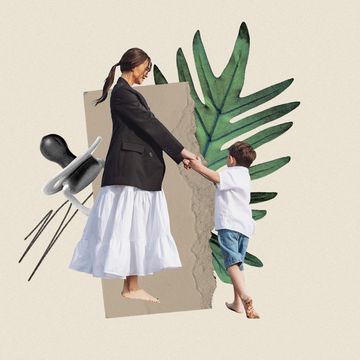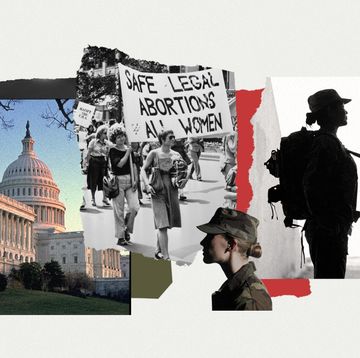I graduated from the University of Colorado Boulder, a school and town known for its liberal culture and equally liberal partying. Though marijuana wasn't legal while I attended (medical cannabis was), tolerance prevailed, and every 4/20 at 4:20, students and town residents would converge on Farrand Field to celebrate weed's big holiday. From afar, the quad looked like a fire had just been extinguished. Under a blue-gray haze of smoke, hundreds of kids got baked out of their minds, brandishing joints the size of shampoo bottles and cracking open plastic Easter eggs full of fresh buds. Stoned or not, you'd notice one thing about this gathering (aside from the fact that it was mostly white kids, and that law enforcement was present but not making arrests, which is fodder for a different article): They were almost all dudes. Their faces form a perfect composite of America's perception of the pot smoker. Bros, bro.
Related: Pot Stirring: Some Are Using Marijuana as Their Drug of Choice to Curb Anxiety
Pot's back-slapping, "I love you, man" culture isn't news—until recently, weed was an industry built mostly by men, and fetishized mostly by men. The shaft of a bong may indeed be elegant design, but if you've ever seen a guy show off his new smoking apparatus, the penis-measuring metaphor is hard to resist. Meanwhile, the stereotypical woman in cannabis culture looks like High Times' wanton weed nymph. (The magazine publishes Miss High Times centerfolds, and runs articles like "Stoner Girls Rock!" featuring pictures of women holding dildo-like glassware, or lounging around in lingerie while they get stoned.) Or the objectified double-breasted bud tender that Ann Friedman has so well considered. Or the sexy power-broker whom Marie Claire has dubbed the stilletto stoner. Or the baked-into-androgyny deadbeat holed up in the dorm room across the hall. (To be fair, I'm not suggesting that all male cannabis professionals and users are misogynistic Scooby Doos.) American slang has a knack for giving stimulants the feminine: White Lady, China Girl, Golden Girl, Mama Coca, Aunt Hazel, Molly. And, of course, Mary Jane. Remember Cypress Hill's 1993 "Hits From the Bong"? Sample lyrics: "She doesn't complain when I hit Mary/With that flame I light up the cherry." As Rap Genius points out, "This is a spousal abuse joke referring to Mary as an actual woman; she probably would complain if you didn't set her on fire first." That lyric wouldn't play right if someone had decided to call marijuana Mr. James. Yet "none of the images of recreational cannabis consumers and activists available to women, including the stiletto stoner, the slacker schlubster, or the hot pot babe, speak to most women," Wendy Chapkis writes in her paper, "The Trouble with Mary Jane's Gender," published last summer in the Humboldt Journal of Social Relations.
Related: 200 of the World's Most Important Women Told Her Their Stories. And That Was Just the Beginning.
Thanks to legalization—as of January 1, you can buy weed from state-regulated storefronts in Colorado—the real women of the weed industry are finally rising to prominence. They are business executives running large dispensary operations, the policy wonks influencing top levels of government, and the impassioned advocates championing the cause. They are casual users with normal lives who take a toke or eat a pot cupcake in the same way other people drink a glass of wine each evening. They don't walk around with pot leaves coyly obscuring their genitalia, and they don't fellate their bongs—at least not for pot-porn pictorials. Many of these women have been thinking about gender divides, too, not least because so many of them put their lives on the line for their jobs.
"This was a nascent industry that was dominated by the black market," says Kristi Kelly, 36, who owns Colorado's Good Meds dispensary chain. "We were literally writing the rules as we progressed. I recall some of my earliest experiences with people who looked at me, didn't see a reflection of themselves, and dismissed me. I'm a professional, younger Chinese-American woman, and they didn't see how I could fit into 'their' world. Since then, there has been a significant maturity of the industry." Progress aside, a black-market aftershock exists, and it is dangerous. Because marijuana is still illegal on a federal level, dispensaries have problems using the banking system. Thus, transactions are in cash, which has to be held and transported in enormous amounts. Since women are indeed part of the business—and often preferred to work the sales counter over men—they find themselves in charge of that other green. Industry estimates put the first week of legal recreational sales around $5 million.
"Women are perceived as easier targets [than their male counterparts] despite mind-boggling security and monitoring efforts," says Betty Aldworth, 37, deputy director of the National Cannabis Industry Association. "Most of the women I know who have to transport cash do so with large men or large dogs to deter would-be criminals." Elan Nelson, 35, Vice Chair of the Medical Marijuana Industry Group and a consultant at Medicine Man dispensary in Denver, says she thinks it's only "a matter of time" until a pot professional, man or woman, is killed for money.
And what about women who use marijuana recreationally? According to a recent Gallup poll, 30% of American women have tried marijuana, compared to 47% of men.
"We've already known it's more men than women, but if you came into our store, you'd see a wide range," says Nelson, 35. At Medicine Man, 1,300 people lined up to buy legal marijuana the first two days of the new law. Nelson happens to be a Navy vet who only smokes "very, very infrequently, maybe once a year." Yet she says, "One of the best things to come out of January 1 is that more women are willing to come out of the woodwork and be open about smoking. The reality is there is an eclectic mix, all ages, all types."
The way things are heading, the marijuana industry needs women more than ever to accomplish legislative goals—both because women are some of its best inside advocates, and because legislation needs women's vote. Or as Chapkis puts it: "Smoking may culturally be a 'guy thing,' but voting is increasingly a 'girl thing.'" Put that in your pipe and smoke it.






